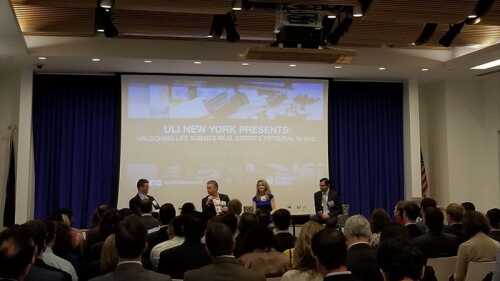We are late in the current cycle, and real estate investors are focusing on the potential risks as much as, if not more than, the rewards on offer, according to investors and investment managers discussing global capital markets at the 2018 ULI Asia Pacific Summit in Hong Kong.
Guy Fulton, managing director of real estate investments for the Canada Pension Plan Investment Board (CPPIB) Asia, said, “Geopolitical risk is something that is not actually that often talked about because it is quite difficult to quantify a lot of these risks and also they are often very binary outcomes. So, there either is going to be a situation in North Korea or there isn’t; and as long as there isn’t, I think most investors would want to keep investing in Seoul and in Korea.”
Other panelists agreed that it was so hard to predict political outcomes that investors were more inclined to focus on factors over which they felt they could exert some control. Meanwhile, Ngee Huat Seek, outgoing chairman of ULI Asia Pacific, said he was more concerned with when the current long cycle was going to end.
“We have had a good run for ten years: low-interest-rate, cheap money—plenty of money. And so the result of that is debt’s been going up and asset prices have been inflating. Things are expensive, and this is not just real estate. That doesn’t mean there are no opportunities. There are, but you have to look very hard,” said Seek.
Comparing the industry to a “boiling frog” that does not realize it is in water that is heating up, he said this about reaching the market peak: “I think the risk is [that] by the time we know, is it too late? Should we be positioning ourselves for that possibility? I think in the medium term, that is a big risk.”
Richard Price, chief executive officer for Asia Pacific at CBRE Global Investors, said, “We spend a lot of time in conferences talking about it being late in the cycle and worried about when the next downturn is going to hit, and looking out for the ‘unforecastable.’ It’s probably going to be something that is not top of the list that causes the next cycle to start.
“We’re clearly closer to the top than we were this time last year. This time last year, I’m pretty sure we were talking about the markets being pretty fully priced around the world. However, we are seeing no shortage of capital to the asset class. It’s actually increasing. The models all say put more into real estate. Are we drawing the wrong conclusions from that data?”
Alice Breheny, global head of research at TH Real Estate, said, “We’re past previous peaks, certainly, but whether it’s relevant to compare to the previous peak, I don’t know. I think we can’t expect much more capital appreciation, but if we try and remember what real estate is meant to do in the portfolio, it’s actually about income. If you have confidence in that income, then I think real estate does have a place in a portfolio, as a good diversifier, versus other asset classes. And on a risk-adjusted basis, it doesn’t look too unattractive.”
Seek noted that “real estate is cyclical, so the ability to hold is key,” adding that as yields for prime real estate are so low, it would not take much movement in interest rates to affect values.
CPPIB’s Fulton said attendees ought to consider the highly leveraged consumer’s position if interest rates were to rise sharply and how that might affect real estate. He also pointed out that when markets change, they change rapidly: “The liquidity environment can change very quickly when the macro environment changes. Money is abundant, and then it’s not.”
Nonetheless, he said that predictions for interest rate increases in the United States this year have so far been incorrect, “so the jamboree continues.” However, he warned: “Ten years ago, no one thought that a few mortgage defaults in California would precipitate a huge financial crisis. What could precipitate it this time? I don’t think we have the answer.”
The panel considered the disruptive effects of technology and ofl climate change. Fulton and Breheny agreed that climate change is now a major concern for investment boards, something that needs to be considered on every deal. Breheny said, “If we’re looking at investing in what we call resilient cities, we place increasingly great importance on sustainability. We consider factors such as good carbon intensity, climate change vulnerability, and air quality.”
Technology is both a threat and an opportunity, panelists agreed. Breheny cited big data as a major opportunity for real estate as tracking activity allowed landlords “to make buildings more productive.” She added, “If we can start to gather data across our entire portfolios, I think it’s going to be crucial to us as investment managers.”
Fulton argued that China was leading the world in many areas of technology and was demonstrating how to adapt physical retail to the demands of online shopping.
A question to the audience revealed that attendees’ favored Asia Pacific markets for 2018 and 2019 were China (cited by 35.4 percent of the voting audience) and Australia (27.1 percent). There also was interest in Japan (14.6 percent) and India (10.4 percent).
Fulton mentioned China’s burgeoning for-rental housing sector as an area of interest, primarily because of the strong government support for its development. “It’s a brave person who bets against the Chinese government when they say they’re going to do something.”
Seek argued that in the long term, underlying economic drivers were overwhelmingly in favor of Asia as a location for real estate investment. “We talk a lot about urbanization and with urbanization comes strong, growing purchasing power. And that’s going to be found in this part of the world. This is going to continue, meaning [Asia] will be the largest investment market in the world over the next 20 years, not the developed markets.”



